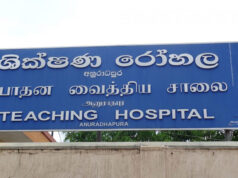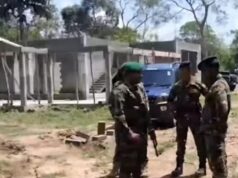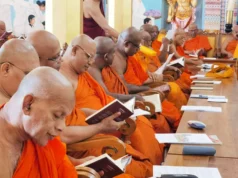Violence cannot be justified, under any circumstances. Therefore, the practice of referring to the JVP bids to topple the governments of the late Mrs. Sirimavo Bandaranaike (April 1971) and JRJ and Ranasinghe Premadasa (1987-1990) as southern insurrections should be stopped. The armed forces and police defeated the JVP and LTTE terrorism. Several other Tamil terrorist groups gave up violence in 1989/1990.
Today, some groups are represented in Parliament. The author of ‘Terrorism & the Criminal Law of Sri Lanka’, Attorney-at-law Asela Seresinghe, who researched at the University of Sydney, under the Australia Awards Scholarship Programme for LL.M, dealt with relevant and related issues. Accountability issues cannot be discussed without taking into consideration the immense sacrifices made by the armed forces and police to ensure the continuation of democratic way of life and the utterly reckless and irresponsible conduct of the corrupt political party setup that has brought the country to its knees. Continuation of Sri Lanka’s pathetic performance, at the Geneva based United Nations Human Rights Council (UNHRC), where the country is under heavy pressure to rescind the Prevention of Terrorism Act (PTA), reminds the public of the recurrent failures on the Geneva front, especially in light of the fact the USA and the UK have much more draconian laws in place to tackle the problem of terrorism.
By Shamindra Ferdinando
The recent high profile arrest of Thilini Priyamali, over the misappropriation of massive amounts of money, underscored the need for a no holds barred investigation into her nefarious activities, as well as those of her ‘investors,’ and her employees. But, it wouldn’t be fair to tar all with the same brush.
In spite of quite an extensive coverage of the case, with the focus on Priyamali’s clandestine transactions, and that of her ‘husband’ Isuru Bandara, several contentious issues remains to be properly addressed and investigated.
However, Sri Lanka’s record in investigating high profile cases is pathetic. As examples, we can site quite a few: corruption charges pertaining to the multi-billion dollar aircraft purchase, involving the national carrier SriLankan Airlines, and the Europe-based Airbus consortium, black money stashed abroad, exposed by Panama Papers, Pandora Papers, and 99 percent of revelations about waste, corruption, irregularities, and mismanagement made by parliamentary watchdog committees, have not been pursued to a proper conclusion by those responsible for doing so.
Perhaps, one of the major concerns is whether Priyamali, and those who invested money through what was advertised as a well-diversified duly registered Thico Group of Companies, were involved in money laundering. For a woman, from an ordinary low income family, in Kalutara, with an education only up to eighth grade, there has to be something more to this whole scam.
Priyamali’s enterprise, that claimed to have been established in a range of industries, including construction, entertainment, gem and jewellery, real estate and trading, operated from the 34th floor of the World Trade Centre, situated within walking distance of the Central Bank, and, virtually, under its nose. What is the Bank’s supposed top intelligence unit doing? The couple even exploited the current economic crisis to seek short term foreign currency investments, on the pretext of procuring the much needed crude oil.
It would be pertinent to ask whether the Central Bank has initiated an inquiry into the Thico affair or looked into the lapses on its part. The Central Bank has repeatedly failed to effectively intervene to stop scams operated by various influential groups who preyed on both the corrupt and the naive. Prima facie Thilini Priyamali’s operation seems no exception but a basic much repeated scam, but on steroids.
The One Transworks Square (Pvt.) Ltd. Chief Executive Officer and Director, Janaki Siriwardana, has been accused of facilitating Priyamali’s operation. In the wake of the CID taking Isuru Bandara into custody, on Monday, now the focus is on Siriwardhana. Former Governor Azath Sally is on record as having said that Janaki Siriwardhana, who introduced him to Priyamali at the former’s office, was involved in the alleged scam. Sally said that altogether he and his associates handed over Rs 226 mn to the Priyamali-Siriwardhana duo. The former UNPer questioned the right of the public to ask how they got so much money, according to an interview he gave to Hiru.
Money laundering is meant to disguise criminal proceeds, particularly their illegal origin. One of the primary objectives of money laundering, under whatever circumstances, is to conceal ill-gotten wealth.
Kamal Hassen’s disclosure
The Trico Group controversy should be vigorously examined, taking into consideration the extremely serious accusations and allegations made by prominent businessman Kamal Hassen, the first to seek the intervention of law enforcement authorities. Having lodged a complaint with the Criminal Investigation Department (CID), several weeks ago, with the help of Senior DIG Deshabandu Tennakoon, the senior officer in charge of the Colombo Range. Utterly frustrated with the system in place, Hassen discussed how Thilini Priyamali and Isuru Bandara swindled him of AUD 100,000, USD 60,000 and 136.75 gold sovereigns. Hassen’s exclusive interview with Chamuditha Samarawickrema (Truth with Chamuditha) should certainly help the CID to ascertain the truth.
Hassen accused the Officer-in-Charge of the Fort police station of interfering in his case, on behalf of the suspect.
The intrepid businessman also questioned how the Thico Group proprietor obtained approval for her bodyguards to carry automatic weapons, in a high security zone. Clearance has been received during the previous administration (before the change of the government in July this year).
Responding to Samarawickrema, Hassen revealed that he was inquiring into the alleged involvement of a well-known person whose identity he declined to reveal. Pressed for an answer, Hassen identified the culprit as a man. At one point, Hassen disclosed how Thilini Priyamali received a call from former first lady Shiranthi Rajapaksa, in response to a call she made two minutes before. Hassen alleged that it was all part of the fraudster’s strategy to unnerve those who had been targeted.
When the writer requested Hassen to clarify some of his accusations therein, the businessman stressed that lawyers, appearing for the fraudster recently, tried to convince him, at the Fort Magistrate Court, where the case is heard, to settle it out of Court.
Hassen repeated what he told Samarawickrema that he was offered Rs 10 mn as the initial payment to drop the case. “The culprits have a right to retain lawyers of their choice. There is no dispute over that. Lawyers, too, cannot be faulted for accepting cases. That is their undisputed right.” Hassen said.
He said that he rejected the disgraceful proposal made by a lawyer, on behalf of the accused, as he wanted to pursue the case. In spite of the interviewer pressing Hassen to name the lawyers, he declined to do so.
However, according to Hassen, the alleged fraudster was represented by two President’s Counsels and four other lawyers. Hassen insisted that he talked to the lawyer who made, what he called, an indecent proposal.
Thilini Priyamali is expected to be produced in the Fort Magistrate Court today (19) from remand. The Bar Association of Sri Lanka (BASL) can inquire into this. But, as always the BASL would conveniently say it wouldn’t do so unless the outfit received a complaint. (The writer received that response when an explanation was sought regarding the high profile Aeroflot case in which the conduct of Attorney-at-Law Aruna de Silva received the attention of the Justice Ministry. The lawyer represented the plaintiff the Ireland-based Celestial Aviation Trading Company Ltd., with Avindra Rodrigo, PC, (litigation) of FJ & G.de Saram, leading law firm from colonial times. The Justice Ministry found fault with lawyer De Silva for accompanying a fiscal officer of the Commercial High Court of the Western Province to deliver a court ruling given by High Court Judge S. M. H. S.P. Sethunge in next to no time on 02 June. The government owes an explanation.
Perhaps the Justice Ministry should explain the current status of that particular investigation in the wake of the Office of Chief Justice Jayantha Jayasuriya, PC, being informed of the issue at hand.
Terrorism & Criminal Law

Attorney-at-Law Asela Seresinhe
Attorney-at-Law Asela Seresinhe couldn’t have launched ‘Terrorism & the Criminal Law of Sri Lanka’ at a better time. Seresinhe dealt with a range of issues, including money laundering (Prevention of Money Laundering Act No 05 of 2006/page 112). Would the Thico Group of Companies be subjected to a comprehensive inquiry? Only time will tell.
Former Attorney General, Palitha Fernando, PC (2012-2014) in his foreword, recommended Seresinhe’s work for students of international law, the academics as well as the general public, including politicians.
Fernando suggested that ‘Terrorism & The Criminal Law of Sri Lanka’ be translated for the benefit of Sinhala and Tamil speaking people.
Former AG Fernando recollected the time Asela and his wife, Maheshika, served as young officers at the Attorney General’s Department at the time he served as the AG. During his tenure as the AG, at the behest of the then President Mahinda Rajapaksa, Parliament impeached Shirani Bandaranayake, the 43rd Chief Justice. She was removed in January 2013. Seresinhe served as a State Counsel in the Criminal Division of the AG’s Department (2007-2017).
Draconian anti-terrorist laws
Seresinhe has quite rightly acknowledged that in the absence of awareness and understanding, a section of the public distrusted anti-terrorism laws (Prevention of Terrorism Act), the Public Security Ordinance and Emergency Regulations. The operation of the criminal justice system, too, is a matter of concern, author Asela Seresinhe has said, while profusely appreciating the contribution made by his father-in-law Anil Silva, PC, in overall enhancement of his legal knowledge.
Seresinhe has examined the issues at hand against the backdrop of the enactment of the PTA (Temporary Provisions) (Amendment) Act No 12 of 2022 in March this year before violent public protests erupted against the then President Gotabaya Rajapaksa. Having acknowledged the absence of universally acceptable Convention relating to terrorism, the author discussed a wide range of issues and related matters taking into consideration both domestic and international developments/situations as well.
The author mentioned 19 specific international instruments, relating to terrorism (Sri Lanka is a party to 11,out of 19). Seresinhe also made reference to the ‘SAARC Regional Convention on Suppression of Terrorism’ finalised in Kathmandu, Nepal, on Nov 04, 1987, meant to battle domestic and regional terrorism, as well as Law of Armed Conflict/International Humanitarian Law. It would have been better if the author briefly discussed the Indian destabiliation project that was meant to pave the way for the deployment of the Indian Army in Sri Lanka. By the time SAARC finalized the anti-terrorism law, the Indian Army was deployed in the Northern and Eastern regions, in Sri Lanka, in terms of the Indo-Lanka accord, forced on the then JRJ government. Actually, successive governments had pathetically failed to address accountability issues, raised by the Geneva-based United Nations Human Rights Council (UNHRC), in respect of Sri Lanka’s response to separatist Tamil terrorism. The UNHRC has focused on the fourth phase of the war (2006-2009), while turning a blind eye to the Indian destabilization project, in the run up to the deployment of the Indian Army here (July 1987-March 1990) and atrocities committed by the Indian Army. India never acknowledged the grave violations committed by its Army.
Actually, Sri Lanka never dared, at least, to refer to the status of the Indian Army deployment here. Geneva, too, conveniently ignored the contentious issue. The undeniable truth is that the Indian Army hadn’t been really subjected to Sri Lanka’s domestic laws, nor the Indian sponsorship of terrorism here ever probed. But, India, now a close ally of the US, vis-à-vis China, served as a member of the UNHRC. India abstained at the vote, on the latest resolution, moved in Geneva, against the war-winning Sri Lanka that pulled off an incredible victory despite all odds stacked against her, especially by the West. Altogether 20 countries abstained. Twenty countries voted for, whereas seven voted against.
The UNHRC is seriously concerned about the PTA. Geneva wants the law abolished. President Ranil Wickremesinghe’s government is under heavy pressure, by Western powers, to do away with the PTA with a section of the Opposition, too, finding fault with the Wickremesinghe-Rajapaksa government for using the PTA to suppress those still protesting against the government. Sri Lanka’s anti-terrorism law has become a huge issue, with those represented in Parliament sharply divided over the incumbent government’s response. But it is a fact that some key Aragalaya activists, while claiming to be peaceful protesters, when the opportunity arose they put into operation their sinister plans, as on May 09 when they looted and torched properties of government politicians, right across the country. Likewise, they stormed the PM’s office and even chased the President out of the country, and also torched the private residence of Mr. Wickremesinghe, by taking the law into their own hands. Luckily for the country, President Wickremesinghe took timely counter measures, after taking office, and, thereby, prevented the overrunning of Parliament, as well, in nick of time.
Whatever various interested parties, especially foreign funded NGOs propagated, all countries are vulnerable and should be prepared to face any eventuality. Some of those who advise Sri Lanka on accountability issues are the worst violators of international laws. The US-UK led invasion of Iraq on ‘sexed up’ intelligence reports on the growing threat posed by Saddam Hussein’s Weapons of Mass Destruction (WMDs), or other Western interventions, as in Libya and Syria, never received genuine attention of the UNHRC. That is the reality. Ruination of Iraq is just one example of the murderous Western strategies meant to annihilate those who didn’t fall in line with their agenda.
UK example
Lawyer Seresinhe asserted that Sri Lanka’s PTA (Prevention of Terrorism Act (Temporary Provisions) Act No 48 of 1979 that had been influenced by the UK legislation, introduced in 1974, to face the challenge posed by IRA terrorism. The lawyer underscored the need for substantial changes to the PTA in view of the continuing threats. The National Thowheed Jamaat (NTJ) mounted the 2019 Easter Sunday attacks at a time the Sirisena-Wickremesinghe administration was busy planning to replace the PTA with new anti-terrorism law. The yahapalana lot pushed for the enactment of the new law, citing the Easter Sunday carnage which could have been thwarted if the government acted on specific intelligence received from the government of India. Obviously, the then President Maithripala Sirisena, and the top UNP leadership, were too preoccupied in fighting an internecine war of their own in the yahapalana government, and its bureaucracy, by their dithering, facilitated the NTJ terror project, by sitting on high value intelligence provided by New Delhi.
The author faulted the political party system for undermining what he called ‘truth seeking’ process. This comment has been made as regards the assassination of one-time National Security Minister Lalith Athulathmudali, in April 1993, and the contradictory positions taken by the police, backed by Scotland Yard, and a Commission appointed, in 1995, by the then President Chandrika Bandaranaike Kumaratunga, in terms of the Special Presidential Commission of Inquiry Law No 07 of 1978. It would have been better if the author, at least, briefly discussed the assassination, widely believed to be one of the most controversial political killings.
The police pointed the finger at the Liberation Tigers of Tamil Eelam (LTTE), primarily on the basis of the recovery of the body of Appiah Balakrishnan alias Ragunathan, an undercover LTTE operative. The body was found on the following day on Mugalan Road, at Kirulapone. Both the Sri Lanka police and Scotland Yard asserted that Ragunathan, having been shot by an Army deserter (Tilak Shantha), employed by Lalith Athulathmudali, in spite of injuries suffered, scaled over the nearby wall and ended up on Mugalan Road.
The bullet fired by Tilak Shantha was found on Ragunathan’s body. Having ridiculed and dismissed the Scotland Yard report, the Presidential Commission held that the late Sirisena Cooray and the late Ranasinghe Premadasa ordered the assassination.
‘Terrorism & the Criminal Law of Sri Lanka’ is a must read for those interested in contemporary security issues, including law students, general public, including politicians as suggested by Palitha Fernando, PC.
Against the backdrop of the US, the UK and India exerting pressure on Sri Lanka over accountability issues, the US imposition of travel ban on Chief of Defence Staff (CDS) General Shavendra Silva and his family, in Feb 2020, and the UK considering action against one-time commander of the celebrated Task Force 1/58 Division, the Chapter 8 that dealt with anti-terrorism laws, in the UK, India and the US, is perhaps one of the most interesting sections.







